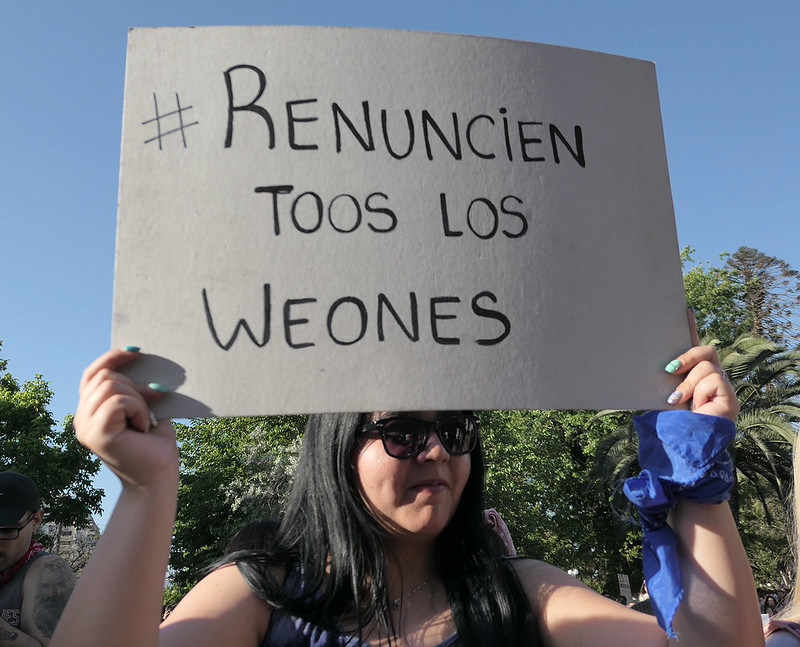The imbalance in the balance of the law.
These days we are observing the consequences of the actions of our legislators.
Their total disconnection and disaffection with the situation that the poor people of the country live, prevents them from seeing the consequences of their actions. Their actions are in no way consistent with those of people who supposedly represent the interests of the majority of the country’s people. Those citizens who, with their votes, have put them in these privileged positions and to whom they turn their backs with total impudence, prioritising the interests of the transnationals.
Today we see how with the approval of the Free Trade Agreement (FTA) with the United Kingdom, in its framework and effects, the private health companies are trying to ignore the rulings of the Supreme Court, which have been favourable to people who contribute to ISAPRES, in the face of their attempts to charge at will totally disproportionate values, lacking commercial and legal foundations, that is to say, unjustifiable increases.
Thus, Banmédica, together with its English parent company HG, have activated the dispute mechanism between Chile and the United Kingdom with the veiled threat, to the executive, that the State has to compensate them or they will take the matter to the International Centre for Settlement of Investment Disputes (ICSID), 90 days after their protocol letter to the president.
While this is happening with the ISAPREs, legislators are passing the Anti-Tomas law, number 21477, which in synthesis, criminalises poor people who are looking for a direct way to provide a roof over their heads to live in with their families.
This law is being passed without addressing the full picture of this situation. More than a third of the Chilean population does not have a housing solution and, in the face of this, the failed Chilean state declares, through its Ministry of Housing, that it can annually build 10% of the total existing deficit (bearing in mind that the number of homeless people continues to increase and that the state’s construction capacity is, according to them, at its limit).
So we ask, what do the legislators want homeless families to do? More than 600,000 families in Chile do not have one and, instead of seeking to legislate to solve the insufficient number of houses built annually, without caring about the concrete and vital situation of these families, they are going in the direction of criminalisation, toughening the measures against people who take land to build their mediaguas, seeking, in some way, to give a provisional response to their situation.
In detail, the legislators are changing the judicial characterisation of the seizure. They are changing the penalties from fines to effective imprisonment, they are facilitating evictions at any time and giving carabineros a free hand to arrest people directly. They will give aggravating circumstances to the penalties against families whose families include children and adolescents in the seizure.
In addition, it places these actions within what is technically called a “rigid framework”, thus preventing judges from modifying or adjusting effective prison sentences. It also seeks to modify article 124, thus providing for the application of precautionary measures that restrict the liberty of those involved prior to trial.
Having pointed out these situations, the public can compare the two laws and their general practical effects. In one, the “neck-and-neck” robbery of multinational health companies from their users is protected, which in itself is a contradiction in terms, and simultaneously, in the other, more than half a million families are left without alternatives, without it being clear to us what they will be proposing as a way out for these families.
Are they thinking of forcing them to leave the country in a forced migration, given that the possibility of finding a roof over their family’s head is nil, and the alternative of looking for a land grab will take them to prison for more than a year, punished for being poor and without a home?
But what is the logic, what perspective do these people use when they legislate? They have no sense of social law or human rights.
It is not for nothing that these “elected officials” have a gigantic loss of prestige and continue to put pressure on the citizens. They think they are back in power, but the current speed and contradiction will remove it from the streets again, and they will have to assume that it is only them who are the cause of this social discontent.
People are clamouring for a change in their political will, specifically in the direction of putting the common good first and foremost. A new world, of necessity, has to be born, leaving behind the madness and insensitivity of today’s anti-humanist decision-makers.
Collaborative writing by M. Angélica Alvear Montecinos; Guillermo Garcés Parada; Sandra Arriola Oporto and César Anguita Sanhueza. Political Opinion Commission






